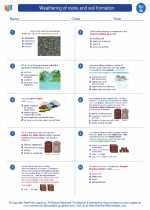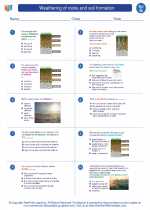Electromagnetic Waves
Electromagnetic waves are a form of energy that is all around us and plays a crucial role in many aspects of our daily lives. They are created by the vibration of electrically charged particles. These waves consist of two main components: an electric field and a magnetic field, which oscillate perpendicular to each other and to the direction of wave propagation.
Key Concepts to Understand
- Properties of Electromagnetic Waves: Understanding the properties of electromagnetic waves, such as wavelength, frequency, amplitude, and speed, is key to comprehending their behavior and applications.
- Electromagnetic Spectrum: The electromagnetic spectrum encompasses all possible frequencies of electromagnetic radiation, ranging from low-frequency radio waves to high-frequency gamma rays.
- Wave-Particle Duality: Learning about the dual nature of electromagnetic waves as both waves and particles, as described by quantum theory, provides insight into their behavior at different scales.
- Interaction with Matter: Understanding how electromagnetic waves interact with matter is crucial in fields such as optics, telecommunications, and medical imaging.
- Applications: Exploring the wide range of practical applications of electromagnetic waves, including in technology, medicine, and astronomy, can help in appreciating their significance in the modern world.
Study Guide
To gain a comprehensive understanding of electromagnetic waves, consider the following study guide:
- Start by familiarizing yourself with the basic properties of electromagnetic waves, including wavelength, frequency, amplitude, and speed.
- Explore the electromagnetic spectrum and the different regions within it, from radio waves to gamma rays. Understand the uses and characteristics of each region.
- Delve into the wave-particle duality of electromagnetic waves and the implications of this duality in various scientific phenomena.
- Study how electromagnetic waves interact with matter, including reflection, refraction, diffraction, and absorption, and how these interactions are utilized in different technologies.
- Research the diverse applications of electromagnetic waves in fields such as telecommunications, remote sensing, medical imaging, and astronomy. Understand the specific principles and technologies involved in each application.
By mastering these key concepts and delving into the study guide, you can develop a thorough understanding of electromagnetic waves and their significance in the natural world and human technology.
.◂Science Worksheets and Study Guides Seventh Grade. Weathering of rocks and soil formation
Study Guide Weathering of rocks and soil formation
Weathering of rocks and soil formation  Activity Lesson
Activity Lesson Weathering of Rocks
Weathering of Rocks  Worksheet/Answer key
Worksheet/Answer key Weathering of rocks and soil formation
Weathering of rocks and soil formation  Worksheet/Answer key
Worksheet/Answer key Weathering of rocks and soil formation
Weathering of rocks and soil formation  Worksheet/Answer key
Worksheet/Answer key Weathering of rocks and soil formation
Weathering of rocks and soil formation  Worksheet/Answer key
Worksheet/Answer key Weathering of rocks and soil formation
Weathering of rocks and soil formation  Vocabulary/Answer key
Vocabulary/Answer key Weathering of rocks and soil formation
Weathering of rocks and soil formation  Vocabulary/Answer key
Vocabulary/Answer key Weathering of rocks and soil formation
Weathering of rocks and soil formation  Vocabulary/Answer key
Vocabulary/Answer key Weathering of rocks and soil formation
Weathering of rocks and soil formation  Vocabulary/Answer key
Vocabulary/Answer key Weathering of rocks and soil formation
Weathering of rocks and soil formation 

 Activity Lesson
Activity Lesson
 Worksheet/Answer key
Worksheet/Answer key
 Worksheet/Answer key
Worksheet/Answer key
 Worksheet/Answer key
Worksheet/Answer key
 Worksheet/Answer key
Worksheet/Answer key
 Vocabulary/Answer key
Vocabulary/Answer key
 Vocabulary/Answer key
Vocabulary/Answer key
 Vocabulary/Answer key
Vocabulary/Answer key
 Vocabulary/Answer key
Vocabulary/Answer key

The resources above cover the following skills:
LIFE SCIENCE
Unity and Diversity
Analyze and interpret data for patterns of change in anatomical structures of organisms using the fossil record and the chronological order of fossil appearance in rock layers.